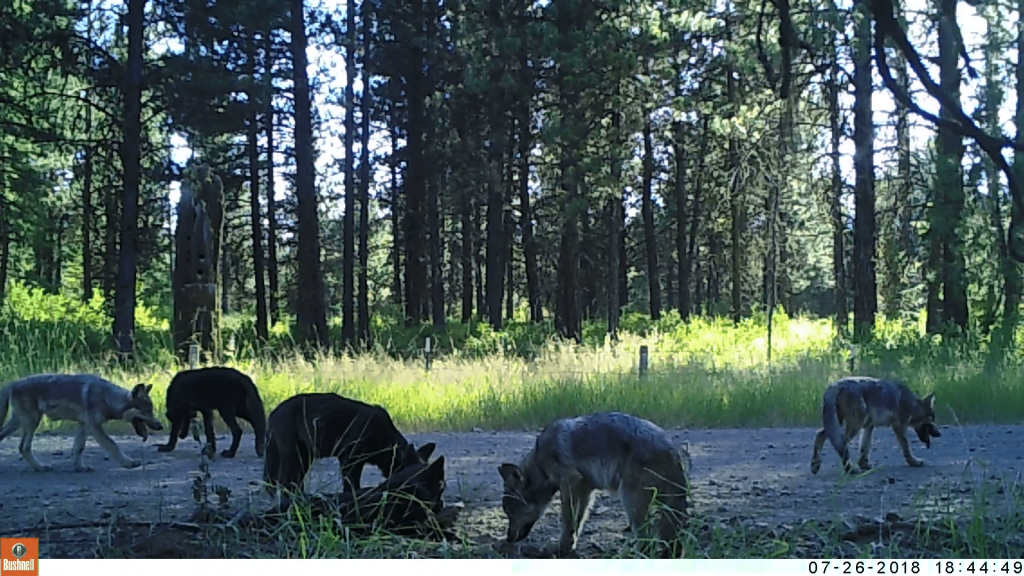
Inslee Wades Into WDFW Wolf Downlisting Proposal
Top state officials traded tense letters over Washington wolves earlier this month as one pressed his thumb on the scale and the other defended his agency’s process in proposing to downlist the hot-button species.
Representative of the nationwide, never-ending tug of war over managing wolves, one of the country’s true wildlife success stories, it began in early August when Governor Jay Inslee (D) made a “request” that the Fish and Wildlife Commission not adopt WDFW’s recommendation to move wolves from endangered to sensitive-protected status.

That drew a strong rebuke a few days later from WDFW Director Kelly Susewind, who wrote that making that request to the “decision makers you appoint even before the Department completes its recommendation is premature and undermines the process.”
In the past two and a half years, Inslee has appointed or reappointed a supermajority of the nine-member commission – Lorna Smith, Melanie Rowland, Tim Ragen, John Lemkuhl, Woody Myers and Steve Parker, and Barbara Baker, respectively. And his letter comes as preservationist groups and legislators, including the governor, work to reform the citizen panel that oversees WDFW policy.
Also in his letter, Inslee claimed wolf downlisting “doesn’t fully follow” and would “contradict” WDFW regulations, but Susewind rebutted that that “legal conclusion … is inconsistent with the Department’s long-standing interpretation of the administrative rule that the Department drafted and adopted.”
And Inslee said moving wolves off the state endangered species list “would be counter to public opinion and would put aside the stakeholder-developed Wolf Conservation and Management Plan.”
Argued the director, “Rigidly adhering to selected elements of the plan in a periodic status review while setting aside other elements intended to incorporate new information ignores the plan, 14 years of Washington wolf population dynamics, and best available science.”

AT ISSUE IS WDFW’S draft periodic status review of wolves, which contains the proposed downlisting recommendation and much more, and for which public comment is being taken through tomorrow evening, August 16.
According to the agency, the shift in state protections is reflective of a population that, since 2008’s first confirmed pack, has “made significant progress toward recovery” goals, with a minimum – meaning at the very least and likely more – of 206 animals as of the end of 2022, yet has just begun to establish itself in the third of the state’s three management regions.
Wolves have done very well in the federally delisted eastern third of the state, where they’re sustaining tribal hunting and depredation removals while also contributing to BC, Oregon and other populations via dispersals, and in the North Cascades they met recovery goals for the first time last year. And while they have been slow to move into the South Cascades and Northwest Coast zone, this year there’s a “breeding pair” near Mt. Adams.
There’s very little chance that numbers of this highly adaptable generalist species will ever slide backwards in the near to medium term, and given their increasing spread across the state, WDFW says they no longer meet the definition of endangered, e.g., “seriously threatened with extinction,” thus their recommendation to downlist.
After public comment is considered and a recommendation is finalized by Director Susewind, it will go to the Fish and Wildlife Commission for a final decision. That had been scheduled for October but now isn’t currently listed on the commission’s year-at-a-glance calendar.
Some would like to see WDFW and the commission go further and open a state hunting season of some sort, but that’s not in the cards under protected-sensitive status. Downlisting would, however, demonstrate the clear progress that’s been made towards reaching recovery goals and reward the patience of those who’ve bought into wolf recovery – grudgingly or otherwise – and worked towards that goal and coexistence with a species that is as disruptive as human are.
BUT OTHERS APPEAR TO WANT wolves to be forever listed, and you might count Inslee among them.
“Wolves are just starting to recover in Washington,” the governor wrote in his August 1 letter to the commission. “At the same time, well over five percent of wolves are being annually poached, poisoned, and hunted through tribal permits, or removed by WDFW when found to be depredating livestock.”
Over the past 14 years, wolf numbers in the state have risen every year by an average of 23 percent.
Inslee worries about Idaho management plans to reduce the Gem State’s wolf population and how that could impact immigration west, speculating that “a 100 percent reduction … may become the case,” which would drop the odds of Washington recovery over a half-century timespan to “27 percent,” he writes.
That seems pretty far-fetched, but not so far-fetched is that Inslee’s communique incautiously appears to provide legal fodder for suing the commission and WDFW over the wording of a Washington Administrative Code related to state and federal ESA designation overlays.
“Your letter draws a legal conclusion regarding compliance with Section 3.2 of WAC 220-610-110,” writes Susewind. “This conclusion is inconsistent with the Department’s long-standing interpretation of the administrative rule that the Department drafted and adopted. Definitive statements that ‘WDFW doesn’t fully follow the WAC’ are particularly troublesome in such a litigious atmosphere. Further, an indictment written from your office in this manner fuels distrust of the Department and undermines our critical mission to conserve fish and wildlife in the state.”
This isn’t the first time or first carnivore species Inslee has waded into the commission’s wheelhouse. Previously, he told members to write stricter nonlethal protocols for wolf-livestock conflicts, which the panel decided against after a very volatile spring 2022 meeting. Now he’s being petitioned again on the same front.
Susewind did state he understood the governor’s concerns about reducing wolf protections and reassured Inslee the draft recommendation maintains the species’ protected status “including precluding hunting” and that the changes between endangered and sensitive “would be relatively small.”
He says that Inslee’s thoughts will be considered when it comes time for he and WDFW to finalize the recommendation to the commission.


